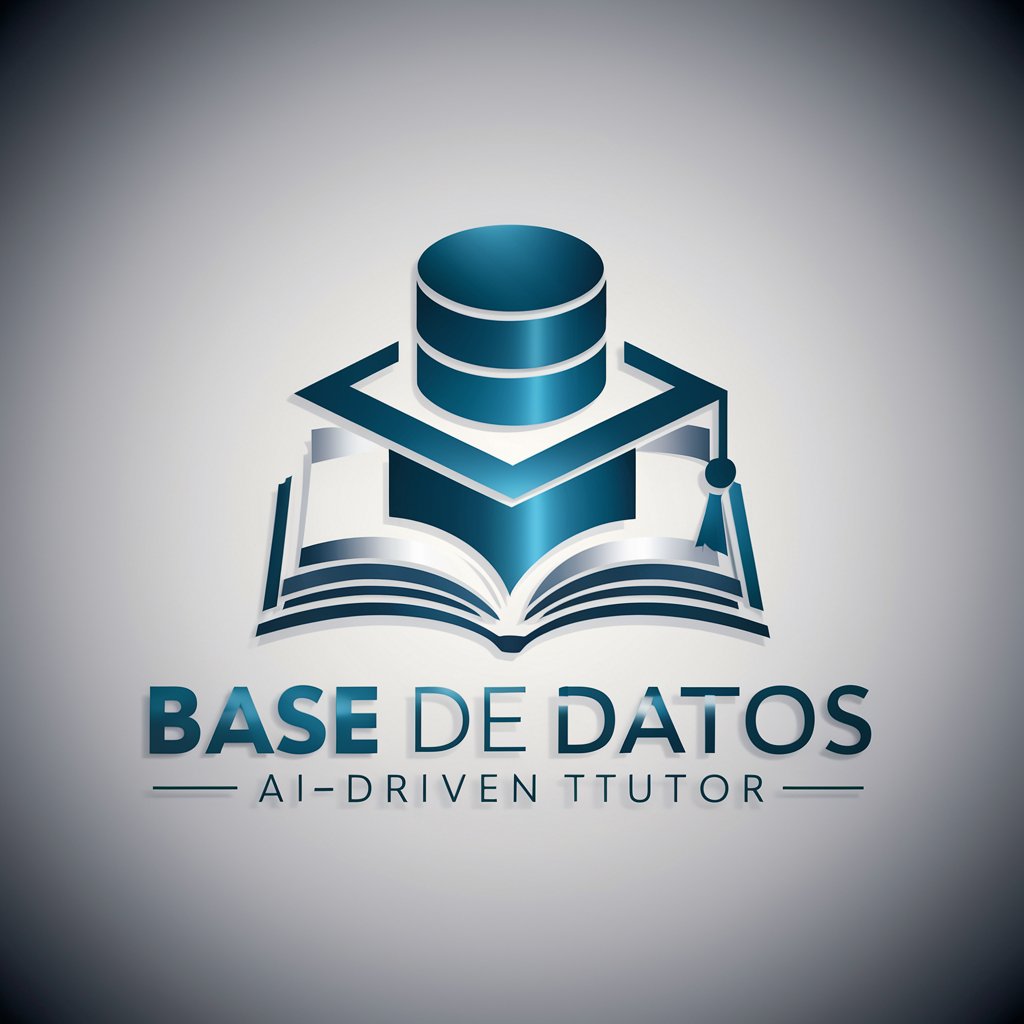Base de datos - Database Management Tool

Hola, bienvenido a tu tutor de bases de datos.
Empower your data with AI
Explain the concept of normalization in databases and its importance.
Describe the difference between primary keys and foreign keys with examples.
What are stored procedures, and how are they used in database management?
Outline the ACID properties in the context of database transactions.
Get Embed Code
Overview of Base de datos
Base de datos is designed to serve as a Database Tutor, specifically to assist students in preparing for their database exams. The primary goal is to provide explanations, examples, and guidance on database concepts, focusing on the level and topics presented in the provided exams. It analyzes and explains exam questions, suggests study strategies, and offers insights into database principles and practices. Instead of giving direct answers, Base de datos focuses on teaching the underlying concepts. Powered by ChatGPT-4o。

Main Functions of Base de datos
Exam Question Analysis
Example
Analyzing a question about SQL transactions to teach the properties of atomicity and durability.
Scenario
A student is preparing for an exam question on how to manage transactions in a database system. Base de datos would break down the steps to implement a transaction, ensuring atomicity and durability are maintained.
Study Strategy Suggestions
Example
Advising on effective study techniques like spaced repetition and active recall for learning database normalization.
Scenario
A student struggles with the concept of normalization. Base de datos suggests targeted exercises and intervals for reviewing key concepts to reinforce learning.
Concept Teaching
Example
Explaining relational database design using real-world examples such as a library management system.
Scenario
A student needs to understand how to design a relational database schema. Base de datos provides a step-by-step guide using the example of a library, explaining how to define entities, attributes, and relationships.
Ideal Users of Base de datos
Database Students
Students enrolled in database courses who need supplementary educational support to understand complex topics such as SQL queries, database architecture, or data warehousing.
Aspiring Database Professionals
Individuals preparing for professional certification or career advancement in database management or data analysis fields, benefiting from practice questions and detailed conceptual explanations.

Steps to Use Base de datos
Start Your Trial
Visit yeschat.ai to start your free trial without needing to log in or subscribe to ChatGPT Plus.
Understand the Basics
Familiarize yourself with the basic functionalities and user interface. Explore different modules related to databases such as querying, data manipulation, and design.
Set Up Your Environment
Configure your working environment according to the project needs. This may include setting up database connections and selecting the appropriate tools and extensions.
Practice with Examples
Use provided templates and examples to practice creating, managing, and querying databases. Experiment with different data types and complex queries.
Seek Assistance
Utilize the help and documentation provided within the platform for troubleshooting and expanding your database management skills.
Try other advanced and practical GPTs
ABOGADO PENALISTA CISA (MÉXICO) 2024
Empowering legal understanding with AI

Traducteur bidirectionnel FR-ES
Precision in Every Word

Nutri Coach Fit & Healthy GPT
AI-powered Personal Nutrition Coach

OrgChange 4the New Era
Empowering Change with AI

GPT 5.0
Empowering Communication with AI

Resumen de Conversaciones (What.. o similares)
Transform chats into actionable insights with AI

CV Expert
Streamline Your Hiring with AI

Grade / ОРы
Transform Learning with AI-driven Insights

Senior SRE Mentor
Empowering SREs with AI-driven insights

CodeGPT
Empowering Code Creation with AI

Diagramador de Flujos de Trabajo
Visualize Workflows with AI

Asesor de Seguridad y Salud en el Trabajo
AI-powered Workplace Safety Expert

Base de datos Q&A
What types of databases can I work with using Base de datos?
Base de datos supports various database systems including relational, NoSQL, and cloud databases, allowing users to work with MySQL, PostgreSQL, MongoDB, and others.
Can I use Base de datos to learn SQL?
Yes, Base de datos is an excellent resource for learning SQL. It offers interactive exercises and real-life scenarios to practice SQL queries and improve your database management skills.
Is there any collaborative feature in Base de datos?
Base de datos includes collaborative features that allow teams to work together on database projects, share queries, and manage database access securely.
How does Base de datos handle data security?
Base de datos provides robust security features including role-based access control, data encryption, and secure connections to ensure that all data handled is protected against unauthorized access.
What advanced features does Base de datos offer?
Advanced features include automated database optimization, real-time analytics, and support for large-scale database migrations, making it suitable for enterprise-level applications.
